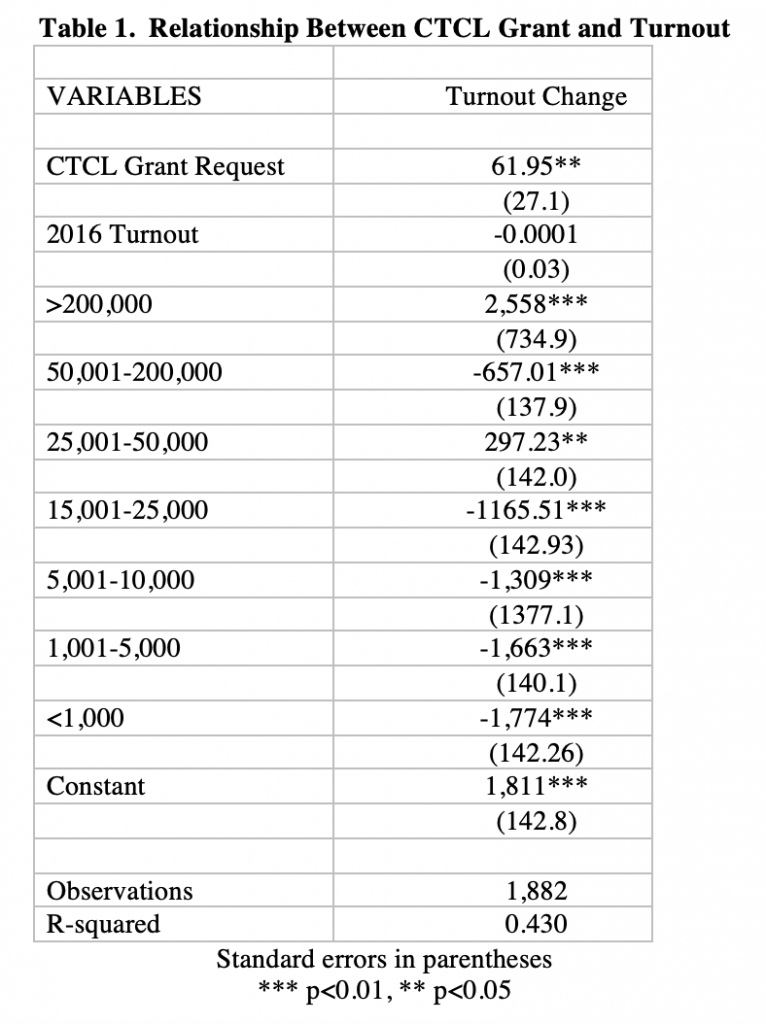By Will Flanders, Research Director
- Election grants from CTCL increased turnout in Democratic areas with no statistically significant impact on Republican areas.
- According to CTCL, 233 municipalities throughout the state received grants for election administration for the November 2020 election ranging from $5,000 to $2.1 million.
- WILL is continuing to take a deeper dive on this and other election integrity issues, with more to be released later this Spring.
In the last few days, a debate has jump-started regarding grants from the Center for Tech and Civic Life (CTCL) following reporting from Wisconsin Spotlight on questionable activities in Green Bay. CTCL is a foundation heavily funded by Facebook CEO Mark Zuckerberg. It describes its mission as “ensur(ing) elections are secure, voters have confidence in election outcomes, and democracy thrives as civic engagement grows.” However, it has come under criticism for making donations to left-leaning areas more than others.
A few weeks ago, a group of lawmakers spearheaded by Senator Duey Stroebel and Representative Adam Neylon introduced legislation that specifies that any third party election grants must be administered through the state and distributed equally to municipalities on a per-capita basis. An important underlying question in this debate is whether these grants actually have an impact on election results. Here, I attempt to answer that question.
The CTCL website provides a list of all the grant requestors by state, including those for Wisconsin. A small number of municipalities that share a name (such as Wisconsin’s four Springfields) don’t provide enough detail for us to determine which one received the grant. Consequently, we are left with 212 municipalities throughout the state requested some amount of funding from the CTCL, from amounts as low as $5,000 to multiple millions. WILL is currently evaluating each of these grants for a deeper dive later this spring, but we already have the data to look at the impact of these grants and their impact on election results.
In the model below, I use a simple statistical analysis to estimate the impact of CTCL grants on turnout. The dependent variable is the change in turnout by municipality from 2016 to 2020 in the Presidential Election. We also control for the size of the municipality, and the baseline 2016 turnout as is recommended in social science for this sort of analysis. Overall, we see an increase of approximately 62 votes per municipality in CTCL-requesting districts.

When we further breakdown this turnout change by partisan identification, we see that turnout change is only significant when one looks at the number of votes received by Democratic candidates. Below, I run the same model as above (though I’ve hidden the control variables for ease of reading). As can be seen, CTCL grants were expected to increase turnout for Democrats by about 49 votes per municipality, while having no effect on Republican turnout. The Figure below visually depicts this relationship.

In elections as close as we have had in Wisconsin in recent years, these relatively small turnout shifts can have a substantial impact on the outcome of elections. 49 additional votes on average may not sound like much, but this would equal more than 10,000 additional votes across the municipalities we know made requests for funding.
Further work is needed to fully understand the impact of CTCL grants, and we will continue to dig deeper. This analysis will be expanded upon once we know how much funding each municipality received, and can pinpoint the duplicate town names. However, it is already clear that measures to ensure that such funds are equally distributed are important for ensuring a fair and equitable election process. Not all municipalities have the means or knowledge to seek out these grants, meaning that not all voters in the state have equal access to the benefits that can be provided by them. A policy change to ensure equitable distribution could remedy that.